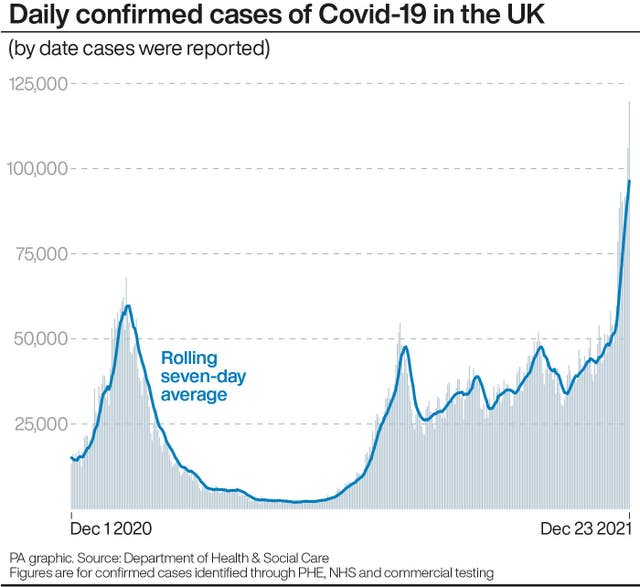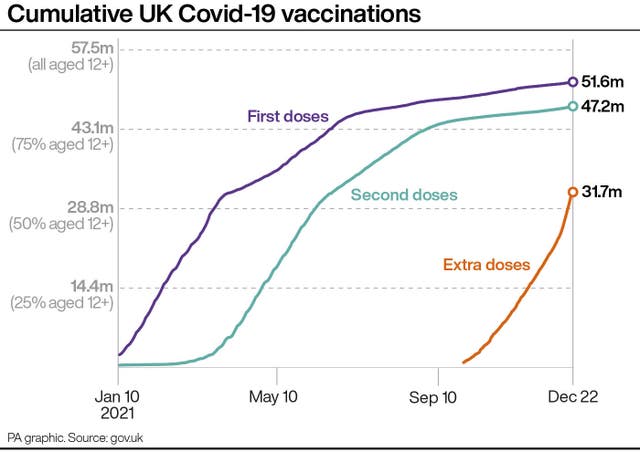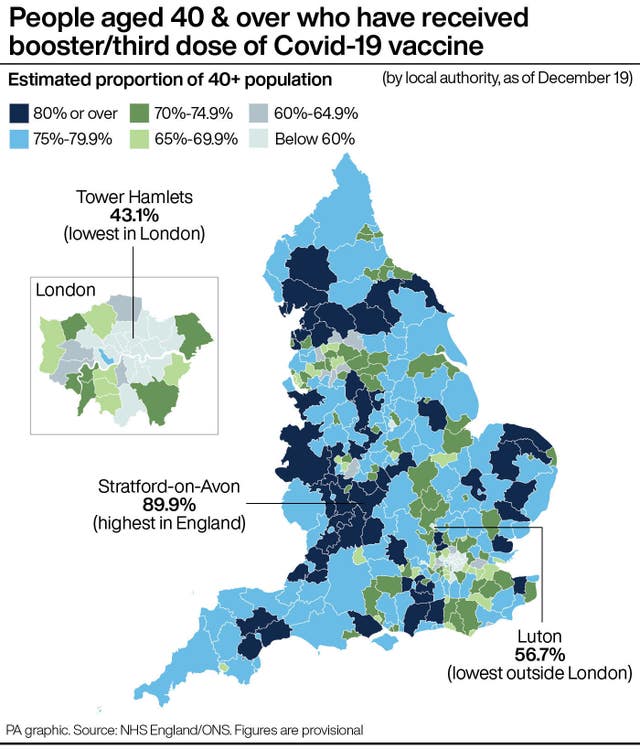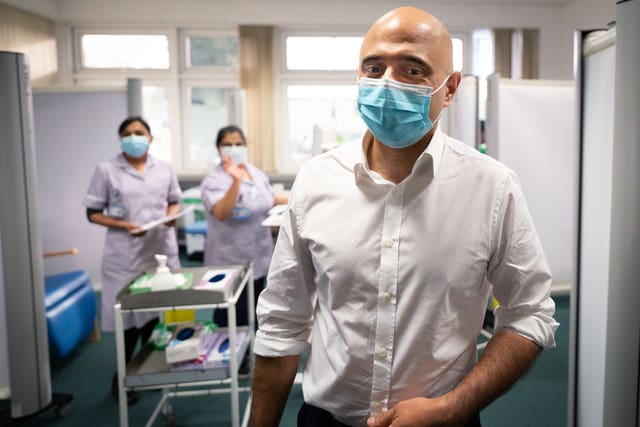
Boris Johnson has urged people to come forward to get a Covid booster jab, as the latest data suggests the Omicron variant of the virus may be milder than others.
The Prime Minister used his Christmas message to tell people to get the “wonderful” gift of a booster jab as part of the “neighbourly” spirit of the season.

On Thursday, the latest analysis by the UK Health Security Agency (UKHSA) suggested that Omicron is milder than past Covid variants such as Delta, with between 50% and 70% of people less likely to be admitted to hospital.
But Health Secretary Sajid Javid has warned that Omicron still has the potential to overwhelm the NHS despite the “promising” data because it is more infectious than past variants.
The health agency’s analysis came as the UK experienced yet another record-breaking number of daily reported Covid cases, with 119,789 reported as of 9am on Thursday.
This was the second day in the whole of the pandemic that daily lab-confirmed case rates were above 100,000, after Wednesday.
In his Christmas message to the nation released on Friday, the Prime Minister will encourage people to get a booster jab.
“Though the time for buying presents is theoretically running out, there is still a wonderful thing you can give your family and the whole country, and that is to get that jab, whether it is your first or second, or your booster,” Mr Johnson will say.
He will add: “We have been getting that vaccination that protects us and stops us infecting others.
“And I hope I can be forgiven for taking pride in the immense spirit of neighbourliness that the people of this country have shown.
“Getting jabbed not just for themselves, for ourselves, but for friends and family and everyone we meet.”
In Scotland, First Minister Nicola Sturgeon also used her Christmas message to urge people to get vaccinated, describing the booster campaign as “a source of brightness during a really difficult month”.
In Northern Ireland, DUP leader and Lagan Valley MP Sir Jeffrey Donaldson said that Covid “should not be underestimated” as he isolates with the infection.

According to the analysis by the UKHSA, the risk of hospital admission for an identified case with Omicron is reduced compared with a case of Delta.
The agency emphasised that its findings regarding the severity of Omicron were “preliminary and highly uncertain” because of the small numbers of confirmed cases currently in hospital.
The data suggests someone with Omicron is estimated to be between 31% and 45% less likely to attend A&E compared with Delta, and between 50% and 70% less likely to be admitted to hospital.
However, Omicron is believed to be infecting more people who have previously had Covid, with 9.5% of people with Omicron having had it before.
Vaccination is also believed to give less protection against Omicron, although a booster jab provides more protection against symptomatic disease compared with the first two doses alone.
Data suggests protection starts to wane 10 weeks after booster vaccination.
The agency has also warned that Omicron’s faster rate of transmission than Delta may mean that a large number of people are likely to require hospital admission, leading to a large amount of pressure on the NHS.

Mr Javid described the UKHSA findings as “promising”, but also said: “Hospital admissions are increasing, and we cannot risk the NHS being overwhelmed.
“This is early-stage analysis and we continue to monitor the data hour by hour.
“It is still too early to determine next steps.”
While Scotland, Wales and Northern Ireland have all imposed new restrictions to combat rising rates of Omicron, England remains an outlier.
Mr Javid had earlier confirmed the Government would not be announcing any new restrictions for England before Christmas.

Ministers were divided over the need for restrictions in the run-up to Christmas, with Mr Javid and Communities Secretary Michael Gove reportedly pressing for action while Chancellor Rishi Sunak and Foreign Secretary Liz Truss argued more data was needed.
Meanwhile a slew of new data underlined the pressures facing the NHS.
The Office for National Statistics (ONS) estimated 1.4 million people in the UK had the virus in the week ending December 16, the highest number since comparable figures began in autumn 2020.
The number of lab-confirmed Covid-19 cases also hit a new daily record with 119,789 as of 9am on Thursday, according to official figures.
New figures from NHS England showed one in five patients waited at least half-an-hour to be handed over from ambulance teams to A&E staff at hospitals in England last week.
Across England as a whole, 18,829 NHS staff at acute hospital trusts were absent due to reasons relating to coronavirus on December 19, up 54% from 12,240 a week earlier and up 51% from 12,508 at the start of the month.
In Wales and Scotland meanwhile, extra military personnel are being drafted in to help ambulance services struggling with a high number of staff absences due to Covid.


Comments: Our rules
We want our comments to be a lively and valuable part of our community - a place where readers can debate and engage with the most important local issues. The ability to comment on our stories is a privilege, not a right, however, and that privilege may be withdrawn if it is abused or misused.
Please report any comments that break our rules.
Read the rules here